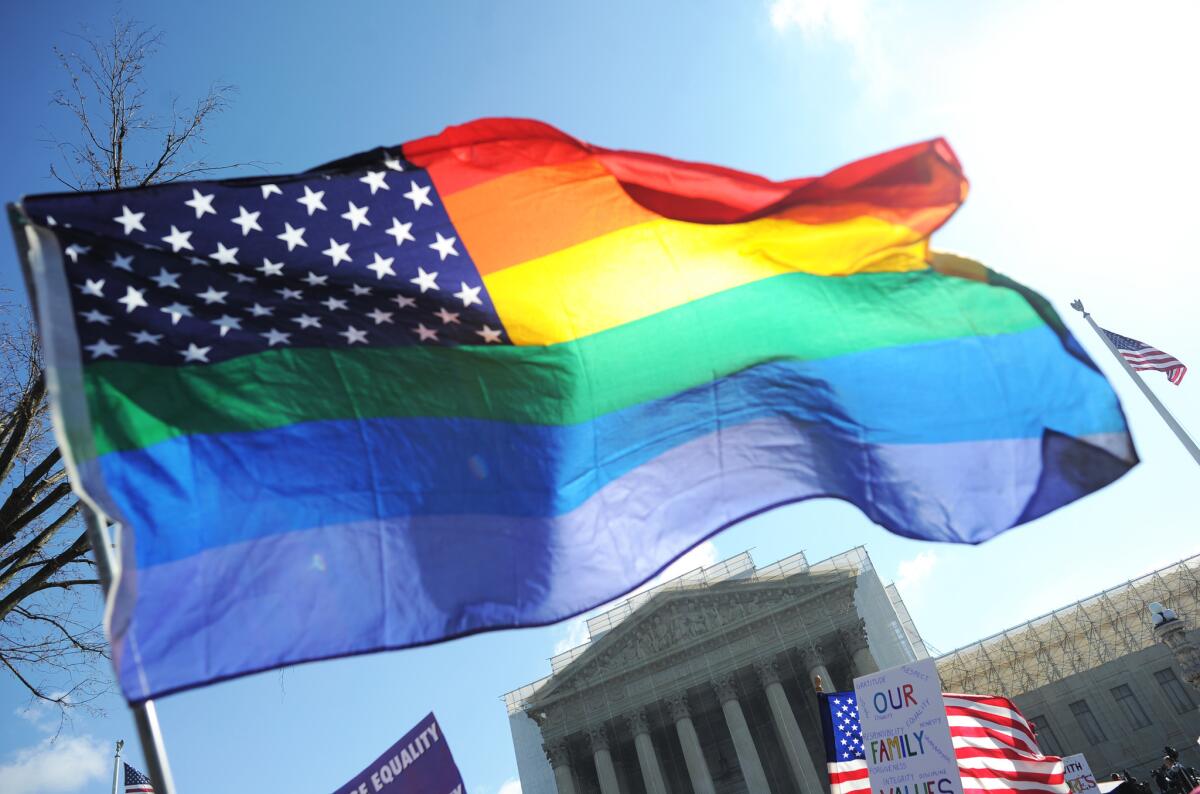McManus: SCOTUS-induced chaos on gay marriage?

- Share via
If the Supreme Court decides the two gay marriage cases it heard last week the way most court watchers believe it will, expect legal and political chaos.
The court seems ready to strike down the federal Defense of Marriage Act, while ruling quite narrowly on California’s Proposition 8, allowing a lower-court decision to stand. Such an outcome would make gay marriage legal in California without deciding whether state bans on same-sex marriage are constitutional.
And that would allow more of what we’ve seen up to now: a growing number of liberal blue states moving to legalize gay marriage, and a growing number of conservative red states enacting bans.
But there will be one big difference: Gays who live in states that allow gay marriage may have an array of federal privileges unavailable to those living in states that ban such marriages. And that raises complex questions.
TIMELINE: Gay marriage chronology
What happens to two gay men who marry in New York and then move to Salt Lake City? Will they still be married? If they have children, will the kids have two parents under Utah law? And will their federal benefits, such as survivors’ Social Security benefits, travel with them, even though they’ve moved to a state where their marriage isn’t valid? Will they file their federal tax returns jointly but state returns separately? And don’t even think about the issue of divorce.
This kind of legal patchwork virtually guarantees that politicians in states that don’t recognize gay marriage will be debating and legislating the issue for years, making for an even more confusing situation. The ensuing chaos could harm more than just gay couples; the Republican Party stands to lose too.
Gay marriage has been embraced by a substantial majority of Democrats and Democratic politicians. In blue states, the trend lines suggest that opinion among Democrats will soon be so one-sided that it will cease to be an issue.
FULL COVERAGE: Prop. 8 and DOMA
It’s different in the GOP. Most Republicans still oppose same-sex marriage by a wide margin, with only about a quarter in favor in a recent Pew Research Center poll. But the survey also suggests that the issue will grow as a wedge that divides the party, in part because of a big generational divergence: 76% of Republicans over 65 oppose gay marriage, while only 54% of those under 30 do.
And when the question is changed from marriage to equal rights, the wedge potential is even clearer: Republicans divide right down the middle as to whether homosexual couples should have the same rights as heterosexual couples, 49% to 48%, with young people again more permissive than older voters.
One leading GOP fundraiser described the conflict to me as “between the Christians and the donors” — Christian social conservatives who want the party to stand forthrightly against gay marriage, and donors who want the GOP to broaden its appeal to young people and moderates as a path toward winning the next election.
Speaking on condition he not be identified, this veteran of conservative campaigns noted that the GOP needs to keep all those groups inside its tent, which will make gay marriage a problem for any would-be presidential candidate in 2016.
All the current prospective candidates have stuck with GOP orthodoxy, making it clear that they oppose gay marriage — with the intriguing exception of Sen. Rand Paul (R-Ky.), who said last week that he thinks the states should have the right to decide.
The best course for a presidential candidate, the fundraiser said, is to try to duck the issue. Paradoxically, this means a bold Supreme Court ruling recognizing a constitutional right to gay marriage might be best for the GOP in practical terms — because it would put the issue beyond the reach of legislation. If the court leaves the issue up to the states, that would give presidential candidates a states’ rights place to hide — but they would still be pressed to take a clear position in caucus and primary states such as Iowa and South Carolina.
And that brings me to the third category of opinion in the Republican Party: A growing group of conservatives, including young evangelicals, who oppose gay marriage as a matter of principle, but who are willing to accept it as a civil institution for people who don’t share their religious beliefs.
“You can believe that homosexuality is a sin and still believe that same-sex marriage can be legal,” Timothy Keller, pastor of the conservative Redeemer Presbyterian Church in Manhattan, told me at a conference sponsored by the Ethics and Public Policy Center.
That segment of the population — culturally conservative but increasingly libertarian on matters of law — may be the one to watch as the debate over gay marriage rolls on unabated even after the court makes up its mind.
Another case, perhaps, of the public moving faster than the politicians.
Follow Doyle McManus on Twitter @DoyleMcManus
More to Read
A cure for the common opinion
Get thought-provoking perspectives with our weekly newsletter.
You may occasionally receive promotional content from the Los Angeles Times.







